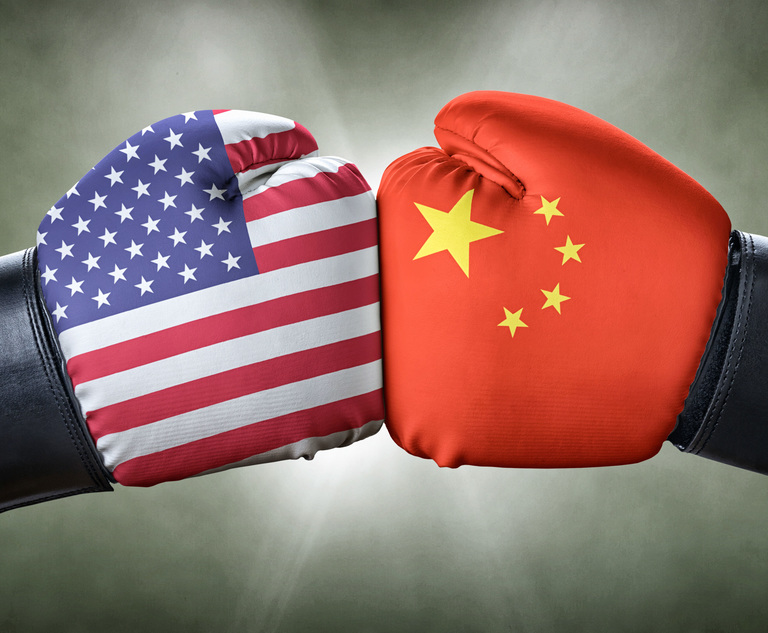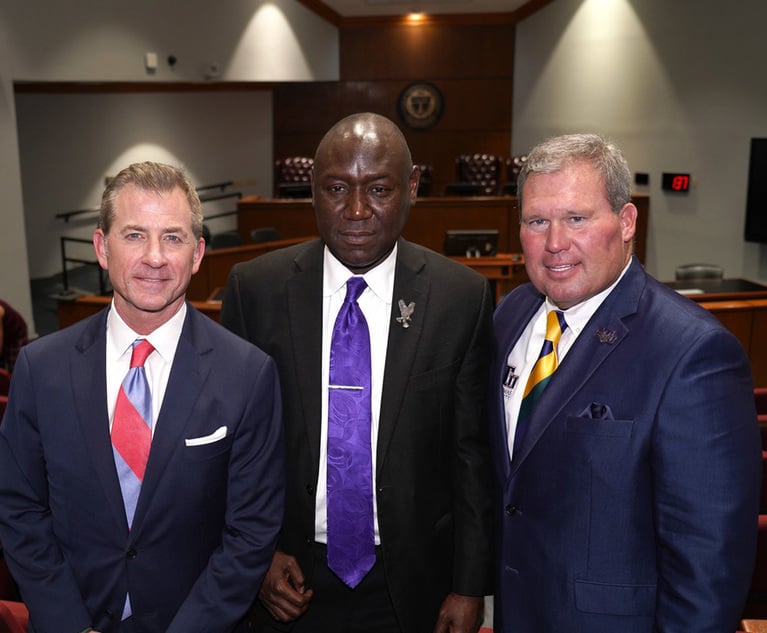 Credit: Boris Zerwann/Adobe Stock
Credit: Boris Zerwann/Adobe Stock Chip Suppliers Pull Back From Yangtze Memory After Biden Ban
New regulations from the Biden administration ban Chinese companies from buying advanced chip-making equipment or employing American citizens without a license.
October 12, 2022 at 12:40 PM
3 minute read
American suppliers are beginning to withdraw staff from one of China's leading chip companies in the wake of new U.S. regulations, a blow to Communist Party efforts to build a vibrant domestic technology industry.
Applied Materials Inc., KLA Corp. and Lam Research Corp. have started or are preparing to pull employees from Yangtze Memory Technologies Co., the country's most advanced maker of memory chips, according to people familiar with the matter who asked not to be identified because the moves are private. The withdrawals are coming this week, the people said, following new regulations from the Biden administration last week that ban Chinese companies from buying advanced chip-making equipment or employing American citizens without a license.
Yangtze Memory was also among more than 30 organizations that the U.S. Commerce Department put on its so-called unverified list, which restricts their ability to buy American technology.
Companies such as Applied Materials that produce chip-making machines often send employees to customer facilities to help them fine-tune the manufacturing processes. It's not clear whether the companies are pulling staff because of Yangtze Memory's placement on the unverified list or because of other restrictions. The U.S. companies need to assess their constraints under the Biden administration's rules.
Yangtze Memory will likely be able keep operating some production lines on stockpiled components, one of the people said.
The company didn't immediately respond to requests for comment. The Wall Street Journal reported some details of the Yangtze supplier moves earlier.
The severity of the U.S. regulations stunned many in the chip industry, potentially jeopardizing the operations for hundreds of Chinese semiconductor companies. The Biden administration argued the regulations are necessary to prevent the Communist Party from becoming more of an economic and military threat.
China has ambitious goals to develop its supercomputers and become a leader in artificial intelligence, said Thea D. Rozman Kendler, Assistant Secretary of Commerce for Export Administration. "It is using these capabilities to monitor, track and surveil their own citizens, and fuel its military modernization."
The Chinese government has made it a national priority to build a domestic semiconductor industry, pouring tens of billions of dollars into the effort. This year, President Xi Jinping renewed calls for the country to develop the technologies critical for national security, invoking the so-called "whole nation system" that propelled China's space and nuclear weapons programs
The Biden rules dealt a serious setback to that effort. Chip stocks and related companies tumbled across the country. Semiconductor Manufacturing International Corp. fell 9.3% over three days, as as Bloomberg Intelligence analyst Charles Shum slashed his estimate on 2023 growth by 50%. Naura Technology Group Co., a leading chip equipment maker, fell by its daily limit for two days in a row.
NOT FOR REPRINT
© 2025 ALM Global, LLC, All Rights Reserved. Request academic re-use from www.copyright.com. All other uses, submit a request to [email protected]. For more information visit Asset & Logo Licensing.
You Might Like
View All
11th Circ.: Contempt Conviction Against Nonparty Requires Proof of Aiding and Abetting Bound Party

St. Thomas University Renames Law School After Civil Rights Attorney Ben Crump
4 minute read

Ex-Prosecutors Weigh Strengths, Possible Defenses in Trump Fraud Civil Suit
Law Firms Mentioned
Trending Stories
- 1People in the News—Jan. 22, 2025—Knox McLaughlin, Saxton & Stump
- 2How I Made Office Managing Partner: 'Be Open to Opportunities, Ready to Seize Them When They Arise,' Says Lara Shortz of Michelman & Robinson
- 3The Intersection of Labor Law and Politics Following the Presidential Election
- 4Critical Mass With Law.com’s Amanda Bronstad: LA Judge Orders Edison to Preserve Wildfire Evidence, Is Kline & Specter Fight With Thomas Bosworth Finally Over?
- 5What Businesses Need to Know About Anticipated FTC Leadership Changes
Who Got The Work
J. Brugh Lower of Gibbons has entered an appearance for industrial equipment supplier Devco Corporation in a pending trademark infringement lawsuit. The suit, accusing the defendant of selling knock-off Graco products, was filed Dec. 18 in New Jersey District Court by Rivkin Radler on behalf of Graco Inc. and Graco Minnesota. The case, assigned to U.S. District Judge Zahid N. Quraishi, is 3:24-cv-11294, Graco Inc. et al v. Devco Corporation.
Who Got The Work
Rebecca Maller-Stein and Kent A. Yalowitz of Arnold & Porter Kaye Scholer have entered their appearances for Hanaco Venture Capital and its executives, Lior Prosor and David Frankel, in a pending securities lawsuit. The action, filed on Dec. 24 in New York Southern District Court by Zell, Aron & Co. on behalf of Goldeneye Advisors, accuses the defendants of negligently and fraudulently managing the plaintiff's $1 million investment. The case, assigned to U.S. District Judge Vernon S. Broderick, is 1:24-cv-09918, Goldeneye Advisors, LLC v. Hanaco Venture Capital, Ltd. et al.
Who Got The Work
Attorneys from A&O Shearman has stepped in as defense counsel for Toronto-Dominion Bank and other defendants in a pending securities class action. The suit, filed Dec. 11 in New York Southern District Court by Bleichmar Fonti & Auld, accuses the defendants of concealing the bank's 'pervasive' deficiencies in regards to its compliance with the Bank Secrecy Act and the quality of its anti-money laundering controls. The case, assigned to U.S. District Judge Arun Subramanian, is 1:24-cv-09445, Gonzalez v. The Toronto-Dominion Bank et al.
Who Got The Work
Crown Castle International, a Pennsylvania company providing shared communications infrastructure, has turned to Luke D. Wolf of Gordon Rees Scully Mansukhani to fend off a pending breach-of-contract lawsuit. The court action, filed Nov. 25 in Michigan Eastern District Court by Hooper Hathaway PC on behalf of The Town Residences LLC, accuses Crown Castle of failing to transfer approximately $30,000 in utility payments from T-Mobile in breach of a roof-top lease and assignment agreement. The case, assigned to U.S. District Judge Susan K. Declercq, is 2:24-cv-13131, The Town Residences LLC v. T-Mobile US, Inc. et al.
Who Got The Work
Wilfred P. Coronato and Daniel M. Schwartz of McCarter & English have stepped in as defense counsel to Electrolux Home Products Inc. in a pending product liability lawsuit. The court action, filed Nov. 26 in New York Eastern District Court by Poulos Lopiccolo PC and Nagel Rice LLP on behalf of David Stern, alleges that the defendant's refrigerators’ drawers and shelving repeatedly break and fall apart within months after purchase. The case, assigned to U.S. District Judge Joan M. Azrack, is 2:24-cv-08204, Stern v. Electrolux Home Products, Inc.
Featured Firms
Law Offices of Gary Martin Hays & Associates, P.C.
(470) 294-1674
Law Offices of Mark E. Salomone
(857) 444-6468
Smith & Hassler
(713) 739-1250






